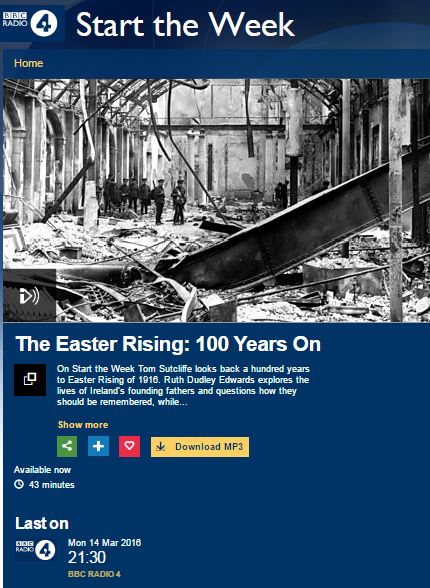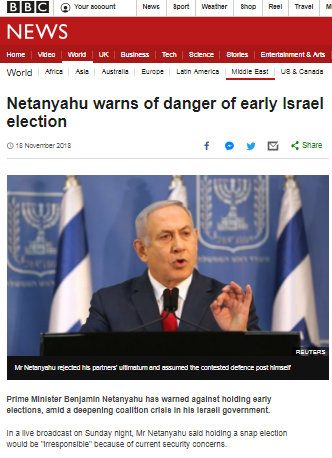As was noted in part one of this post, BBC News website reporting on the Israeli government’s intention to bar Al Jazeera from reporting and broadcasting in Israel failed to provide any examples of the incitement broadcast by the network that prompted that move – in sharp contrast to its coverage of a recent similar case in the UK.
The story was also covered in the BBC World Service radio programme ‘Newshour‘ on August 6th with presenter James Menendez introducing the item (from 38:30 here) as follows:
Menendez: “The Israeli government says it wants to take the Qatar funded broadcaster Al Jazeera off the air. The move was announced by the country’s communications minister Ayoub Kara at a news conference in Jerusalem today.”
Listeners then heard a voice-over translation of a small part of the minister’s statement.
Voice-over: “We have identified media outlets that do not serve freedom of speech but endanger the security of Israel’s citizens and the main instrument has been Al Jazeera which has actually caused us to lose the best of our sons and has been the source of incitement.”
Menendez: “So what exactly did he mean and why now? Questions for our Middle East correspondent Tom Bateman.”
Those two questions are obviously crucial to audience understanding of the story but did Tom Bateman actually provide any answers?
Bateman: “The communications minister in this press conference today said that it was about a long-running dispute that they have with the network, accusing it of inciting violence – he said – siding with extremist organisations. And this has been a refrain we’ve heard from the Israeli government repeatedly; not least from the prime minister Benjamin Netanyahu who last month launched an outspoken attack on the network. He said that it was inciting violence, particularly around the recent security crisis over the holy site of Haram al Sharif – Temple Mount – in the old city of Jerusalem. Now this was a particularly violent episode that lasted a couple of weeks and the prime minister had effectively suggested that the network’s reporting of that event – the events surrounding it – was leading people to violent attacks or at least suggesting that they carry them out.”
Failing to provide any examples of such incitement or to clarify the term “extremist organisations”, Bateman then swiftly moved on to the technicalities.
Bateman: “I mean the specific measures being suggested this afternoon are that the Israeli government will seek to force cable and satellite providers to block the signal in Israel and also to revoke the press accreditation – the press cards – for Al Jazeera reporters in Israel, which will effectively make it impossible for them to work here. The network itself has been covering this extensively today and recently its bureau chief in Jerusalem said that in effect Israel and its prime minister was siding with Arab autocratic states who similarly had sought to ban the network.”
Menendez: “Yeah, that was gonna be my next question. Is this Israel just doing it for its own reasons or is it acting – perhaps not in conjunction – but at least siding with those countries who’ve been demanding that Qatar shut Al Jazeera down? And I’m thinking of course of, you know, countries like Egypt and Saudi Arabia.”
Bateman: “Well certainly that would be the view of the network itself who’s, you know, have said that amid this furious diplomatic rift between a number of Sunni Arab states – including Saudi Arabia and Egypt – and Qatar, which of course funds Al Jazeera, that they believe Israel is simply siding with them because it’s politically convenient to do so. I mean its editor also pointed out what he called was the irony of Al Jazeera being one of the very few media networks in the Middle East that is prepared to air, you know, Israeli voices – Israeli government voices – and yet they believe that a self-proclaimed functioning democracy has sided with dictatorships, as he put it.”
Listeners then heard the following garbled portrayal of the core story which obviously did nothing to inform listeners about the kind of incitement broadcast by Al Jazeera and also confused bias and one-sided reporting with the very serious issue of incitement.
Bateman: “I think the Israeli government view will be simply that it’s had enough and in their view they, well, believe, you know, particularly the Arabic facing service they believe has, you know, been biased against Israel. They will say it’s failed to give, you know, sufficient credence to the Israeli argument – the Israeli side of arguments – in these situations and therefore that that is, you know, that incitement is so serious that it merits closure.”
Bateman went on, returning to the technical topics with which he is clearly more comfortable:
Bateman: “Having said all of that, this will have to go through the Israeli parliament and that may be easier said than done because I, you know, particularly with the desire to block transmissions, that it likely to require parliamentary approval so there’s no time scale on this. It is simply at the moment a desire of intent.”
Menendez: “And just to be clear, is it both the Arabic and English networks?”
Bateman could at this point have clarified the significant differences between Al Jazeera’s English language and Arabic language content but declined to do so.
Bateman: “Well certainly they both operate from…they have correspondents of both language services in Israel – in Jerusalem – and so I think the assumption must be that it will be…will be both. I don’t think, you know, the Israeli government sees a distinction.”
As with the BBC News website’s written article, this report failed to adequately explain the story to audiences because it refrained from providing them with any examples of the kind of incitement that is at its core. That editorial policy turns the story into no more than a list of competing claims which audiences then have to judge for themselves without the benefit of factual information. Clearly that approach does not meet the BBC’s remit of providing “accurate and impartial news […] so that audiences can engage fully with issues” and it stands in sharp contrast to its own reporting of the recent similar story concerning the closure of a UK radio station on the grounds of incitement.
Related Articles:
BBC’s Israel-Al Jazeera row reporting displays double standards – part one
Al Jazeera English (CAMERA)
Al-Jazeera America (CAMERA)
Looking back at the sourcing behind BBC reports on Qatar – part two




